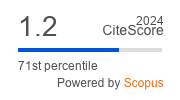Verbal Representation of the Future Career Concept by Theology Students
Keywords:
concept, framing analysis, scenario, script, theologian profession.Abstract
The article analyzes the verbal representation of the future careers concept by the theology students. The basic approaches to the interpretation of the term concept (linguistic, psycholinguistic and cultural) are highlighted. The article contains the main methods of conceptual analysis: associative analysis, framing analysis, analysis of definition meanings, etymologic analysis, cognitive-semantic analysis, etc. The basic five stages of frame analysis of the text are described, which also contains a characteristic of elaborating the scenarios and script of the text. Framing analysis of verbal representation of future profession concept was made by using the materials of unfinished sentences. As a result six frames (religious terms, occupation, life, people, inner world and time) are identified. Frequently used words in each category are: religious terminology – God, salvation congregation; occupation – service priesthood shepherding; life – word life, road; people – man, person, nation; inner world – soul vocation responsibility; time – hour, day, week. The analysis of the dynamics of the most used words according to the course is implemented. The scenario of studied texts about theology students' future profession is constructed: person, God, hour, salvation, soul. Framing analysis is allowed us to construct a script of researched text: vocation – service – responsibility.
References
- Bodnaryuk, Yu. (2013). Kontsept yak skladova chastyna kontseptosfery u movniy kartyni
svitu [Concept as a part of the conceptual sphere in language worldview]. Anhlistyka ta
amerykanistyka,10, 4-7. - Zalevskaya, A. (2001). Psiholingvisticheskij podhod k probleme koncepta
[Psycholinguistic approach to the concept]. In: Methodological problems of psycholinguistics,
(pp. 36–45) Voronezh: Voronezh State University. - Zasiekina, L., Zasiekin, S. (2008) Psykholinhvistychna Diahnostyka [Psycholinguistic
Diagnostics]. Lutsk: Vezha. - Klimov, E.A. (1996). Psihologiya Professionala [Psychology of Professional]. Moscow:
Institute of Applied Psychology. - Muntyan, L. (2013). Kontseptual’nyy analiz ta metody doslidzhennya verbalizovanykh
kontseptiv [Conceptual analysis and methods of verbalized concept research]. Scientific Notes.
Series “Philology”, 33, 103-105. - Sergeyeva, E. (2009). Ponyatie kontsepta i aspektyi ego izucheniya v sovremennoy
lingvistike [The notion of the concept and aspects of his study in modern linguistics]. Bulletin of
VEGU, 3(41), 72-85.







 Creative Commons «Attribution» 4.0
Creative Commons «Attribution» 4.0